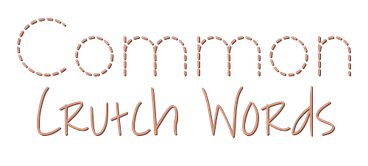
Ah, crutch words. How crippling they can be.
Anyway, um . . .
As I was saying . . .
Imagine how much stronger my post could have been if I'd gone straight to the point. Crutch words tend to babble. They are anything from the terms that go through your mind when you're thinking (of what to say next) to words and phrases (yes, phrases too) that fill the audible space while your brain comes back online.

One of the biggest offenders is that. The image above is a screenshot of a manuscript I was working on years ago, but though the image is old, it's still a common habit for authors of all genres.
That is a good place to start when it comes to killing crutch words. And when your use of that refers to a person, be sure to use who, as that is strictly correct.
When cleaning your manuscript, keep an eye out for false starts (anyway, okay, well), gawky encores (know what I mean?, right?, and so on, and well . . . yeah), and your crutch words.
We tend to write how we speak, so if you speak with crutch words, you're likely to have used them in your manuscript. They aren't as obtrusive during speech, but when they are written (and therefore read) repeatedly, it's distracting. If you have the time to read your manuscript aloud or, better, have it read to you, you'll get a better understanding of which words you tend to lean on.
Get it? Because you lean on crutches . . .
ba dum tss

Story organization with no wasted planner space.
Utilize every page, no matter what is going on in your world.
Without further ado—sorry, I couldn't resist—here is a list of words that are unlikely to add substance to your story. Eliminating or rephrasing could go a long way in ensuring you have a crisp, fun, and easy-to-read book.
| a lot | obviously |
| actually | of |
| almost | quite |
| awesome | rather |
| basically |
really |
| begin to |
seem to |
| definitely |
seriously |
| down |
sexy |
| feel |
that |
| honestly |
totally |
| just |
truly |
| like |
up |
| literally |
very |
